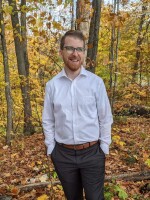The Dalai Lama among the three most influential people in his life. he “opened new horizons for souls and for the Church.” He was the subject of a Judy Collins and a by Charles L. Mee. His writings inspired many, but few have heard him speak.
That's one reason it's so compelling to hear Merton's voice alongside the music of Columbus composer on his 2022 album .

Merton made the recordings in a small hermitage in the hills of Kentucky in 1967. As , he had a lot to say, and his recordings inspired Brian Harnetty to create a musical accompaniment that adds much to the words of a man who changed countless lives. Harnetty puts his music in dialogue with Merton's words, complementing them and filling the silences between them.
I recently met with Harnetty and local photographer at Scioto Audubon Metro Park to talk about the album in the environment Thomas Merton loved best, out among the inspiring beauty of the natural world.

Merton had a unique ability to relate abstract philosophical ideas to everyday sights and sounds, and Harnetty seems uniquely able to relate that work to the present moment. During the course of the walk, he pointed out birds, trees, and flowers that Merton would have liked. He described “doing the old Merton thing,” a way of using everyday listening practices to understand the deepest qualities of spirituality, humanity, and the universe we inhabit.

In the recordings of Merton’s voice featured on Words and Silences, one can hear the marks of his struggles thinking about war, racism, environmentalism, and his own tumultuous personal life. Just listen to this excerpt from “Who Is This I?” from the album:

“I was paying attention to not only the content of the text but also the content of the voice,” Harnetty said.
As a child, he was drawn to Thomas Merton because of his international and interfaith connections.
“I grew up Catholic, and I started to read Merton as a way of opening up to the world for myself and saw in his philosophy and his openness and vulnerability to others a way to think through some of those issues that I had been struggling with. And so, he was kind of a gentle way for me to argue with my parents over religion and so forth,” he said.

Harnetty admires Merton’s curiosity and his ability to relate deeply philosophical spiritual ideas to the everyday sounds he heard all around him.
"Despite the fact he was a published author," Harnetty said, "he never came across to my mind as being someone who had all of the answers… There’s always in the background a lingering curiosity and uncertainty that pushes him to try to stay open to the world even when it goes against the rules, even when it’s different from anything he’s done before.”
In “Breath Water Silence” from the album, Harnetty works with a recording in which Merton has been reflecting on the complex and challenging spiritual ideas of the Muslim scholar Ibn ʿArabī. Merton deftly relates them to the simple sounds of birds and dripping water that he heard that morning at the hermitage. Listen to this excerpt from the piece:

“I just think it’s using your senses to become aware of what’s around you, because we often block those things off. We forget about them or we push them away. But for him, it’s a continual process of remembering where you are by using your senses... And so, I tried to reflect that in the music,” Harnetty said.
He described starting his compositional process on “Breath Water Silence” with a small phrase from a piece of music that Merton loved, “” by the Kansas City pianists Meade Lux Lewis and Albert Ammons. Harnetty slowed it down to make space for Merton’s voice then added a triplet phrase to accompany the imagery of water droplets.

Though the album is now finished, Harnetty continues to creatively engage with sound and music in a variety of ways. Concertgoers will enjoy upcoming performances of his music in Ohio with and with in November of 2023. He also has a forthcoming handbook for listening in the woods in meaningful and impactful ways. Look for details on his website at .








